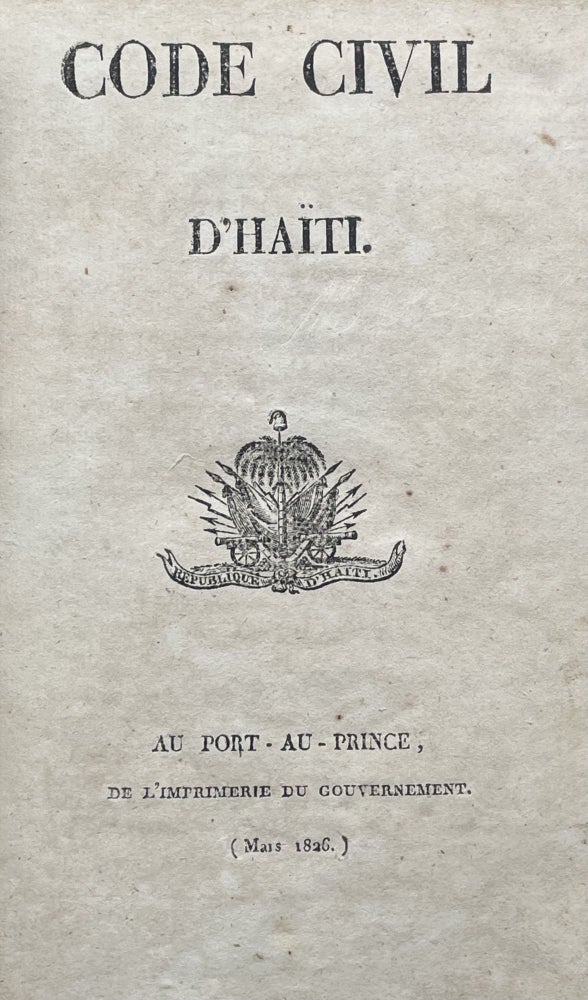Code civil d’Haïti.
Au Port-Au-Prince: De l’Imprimerie du Gouvernement, Mars 1826. First edition. In contemporary half leader, spine gilt. Marbled endpapers, tinted and gauffered edges. The quality of the paper used by the printer varies. Binding rubbed, corners bumped, otherwise in fine condition.
Exceedingly rare legal monument, the Port-Au-Prince-first edition of the first Haitian civil code.
One of the first French colonies in the New Word Saint-Domingue eventually gained its independence in 1804 after two centuries of slavery and the only successful slave rebellion in human history led by such figures as François-Dominique Toussaint L’Ouverture, Jean-Jacques Dessalines, and the later second President of the Republic Jean-Pierre Boyer. The independent country took the name Haiti, the aboriginal name of the island, and its Act of Independence marked the beginning of a long legal process of the first black republic of the world.
During the years of his presidency between 1818–1843, Jean-Pierre Boyer (1776–1850) still had to work hard on the acknowledgment of Haiti as an independent nation, which had been recognized by France only in 1825, in exchange for an indemnity payment of 150 million francs. One of the elements the country presented to the international community that could be interpreted as signs of the establishment and strengthening of the state, was the process of legal coding and the publication of the country’s six law codes: the Code of Civil Procedure, the Commercial Code, the Criminal Code, the Code of Criminal Procedure, the Rural Code, and the Civil Code, the present Code civil d’Haïti (Santos Pereira, 2021), of which the Civil, Rural and Penal Codes are considered the founding documents of the Haitian Republic through their continuous use and reference in Haitian law and popular discourse. (Schneider, 2018; Collot, 2007)
Code civil d’Haïti is formed of 2,047 articles referred into thirty-five sections. It was compiled by a commission tasked with developing the Haitian legal system, headed by the French lawyer Louis-Antoine Blanchet and it is largely based on the Napoleonic Code, the civil code of France. Code civil d’Haïti, with the date of execution of May 1, 1826, was decreed by the House of Common (Chambre des Communes) on March 4, 1825, accepted by the Senate on the 26th, and promulgated on March 27 by Jean-Pierre Boyer the President of Haiti, and it was first published in print in Port-au-Prince in March 1826. In the same year, two editions appeared in Paris one by Blaise Jeune and the other “by a citizen of the Republic” (Par un citoyen de la République; impr. de E. Duverger), according to Yves Lassard who gathered the bibliography of the Haitian legal sources another one was published in Angers however it seems to be a ghost edition (Lassard, 2013).
Extremely scarce, WorldCat locates only one copy of this edition, held at the British Library. We traced two further copies in the US (Boston Public Library; LOC).
Sabin 29568.
Collot, I. Gélin. "Le code civil haïtien et son histoire." Bulletin de la Société d'Histoire de la Guadeloupe, number 146–147, 2007, pp. 167–185. .
Price: €20,000.00


